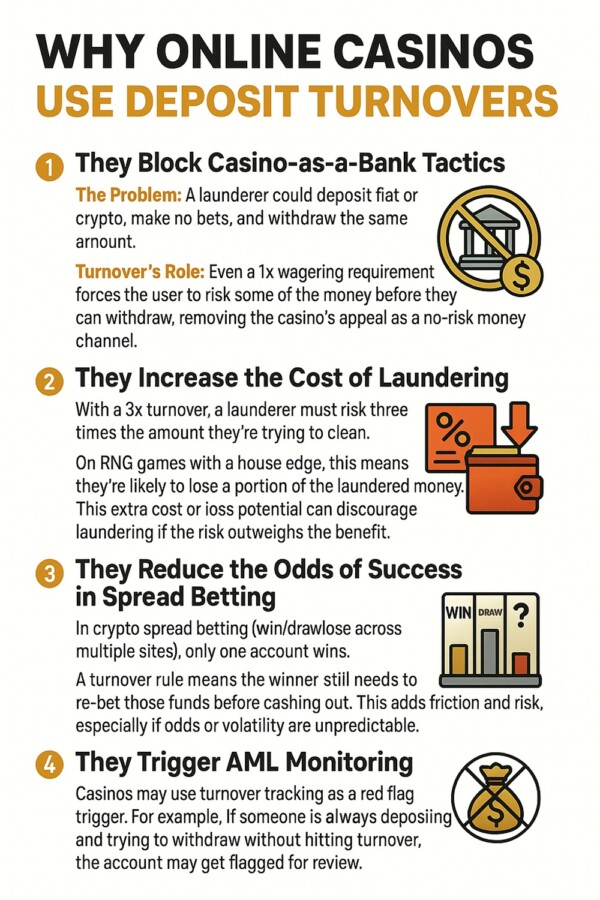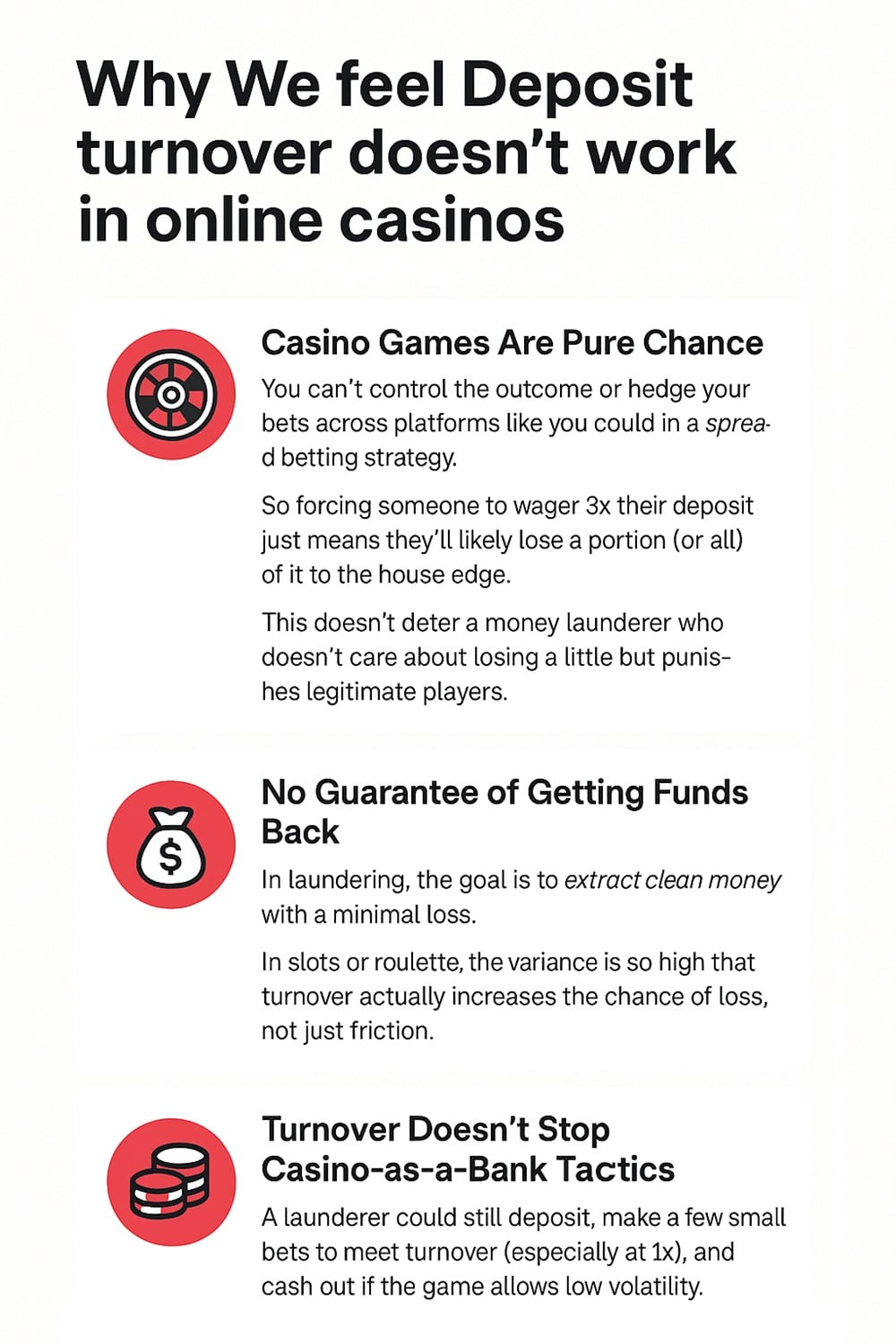One question we see often is why online casinos use deposit turnover for free withdrawals. The answer is to prevent money laundering, and therefore, this is an AML (Anti-money laundering) prevention method. But the question is, do deposit turnovers really prevent anti-money laundering? Casinoplusbonus investigates.

Table of Contents
Warning: Money laundering whether through an online casino or sports book or via other means is illegal. Most countries come with stiff penalties if you are caught. This guide is purely educational to let you know how the iGaming industry uses deposit turnovers to deter money laundering.
What is a deposit turnover?
As deposit turnover is the number of times you need to bet your deposit in order to receive a free withdrawal from the casino. Otherwise, the casino may charge you a percentage of your withdrawal amount. Casinos and sportsbooks online say they use these deposit turnovers to prevent money laundering, but honestly, deposit turnovers are not really necessary, and we’ll reveal why we think this is the case.

In-depth deposit turnover guide: If you would first like to understand what a deposit turnover is, then read our guide covering what a deposit turnover is.
How do people launder through casinos?
The most common method is by using cryptocurrency and a spread betting system using cryptocurrency. People target unregulated crypto casinos that often do not verify wallet ownership, creating a loophole for laundering.
The loophole consists of two factors. Peer-to-peer transactions from non-custody crypto wallets are nameless, and there is no wallet verification; it is easy to launder money from these gambling sites. As for the spread betting system, money launderers don’t spread bet at one casino or sports book, but instead spread bet across multiple gambling websites.
Here is how they do it:

- A friend can deposit crypto into three casinos or sportsbooks from any crypto wallet, and generally, casinos will not verify the owner of the wallet.
- The account holder uses the crypto to place a bet on a win, draw, or lose at each casino.
- One of the bets will win at one of the sportsbooks or casinos.
- The person then sends the crypto back to a wallet address as casino winnings, converts it into fiat currency, and deposits it into their bank account.
- From here, the money looks as if it is gambling winnings and tax-free when filing your yearly tax returns. It is essentially tax fraud, but it can be challenging to spot for tax authorities.
It may seem like a great trick, but the odds have to be correct. Plus, unregulated gambling sites are risky places to deposit large sums of cash as there is no guarantee they will pay you back.
How does deposit turnover prevent money laundering?
We can agree on one thing. Deposit turnovers can help prevent money laundering for sports betting.
Let’s say an online casino has a 3x deposit turnover. It would mean that anyone trying to launder money by using multiple casinos is a complex process. The spread betting system explained in the bullet points in the section above would require the owner of the account to make these spread bets three times over to win their money back.
The issue is, two of the bets at two of the gambling websites have already been lost. Right now, the account owner has one balance remaining and still needs to turnover that deposit two more times for a free withdrawal.
You can see how the deposit turnover works to prevent money laundering for sports betting. Yet, we still feel that deposit turnovers are a waste of time, and we’ll explain further below.
What about money laundering using fiat currency?
While regulated fiat casinos are much harder to exploit, laundering still occurs, especially on unlicensed or offshore platforms. Deposit turnover is one part of a larger AML toolkit that also includes identity verification, transaction monitoring, and strict financial controls.
Structuring (a.k.a. Smurfing)
- The launderer deposits small amounts of fiat across multiple casino accounts to avoid triggering red flags.
- These deposits are then gambled lightly or not at all.
- Funds are withdrawn as winnings, which appear legitimate, especially if coming from a known gambling site.
Collusion / Chip Dumping
- Two or more players collude in games like poker.
- One player intentionally loses to the other, transferring illicit funds under the guise of fair gameplay.
- The winner cashes out the legitimately earned winnings.
Casino As Bank
- A person deposits fiat into a casino, does minimal or no betting, and then requests a withdrawal.
- If the casino allows withdrawals without gameplay (or with only minor turnover), it becomes a money-moving tool.
Fake Identity or Third-Party Accounts
- Use of synthetic IDs or buying verified accounts to move money.
- If a platform lacks proper KYC (Know Your Customer) checks, criminals can bypass identity checks altogether. The issue here is that the source of income can be hidden or routed to bypass taxes or to make funds look like casino winnings, which in many countries are tax free.
Why is money laundering difficult at regulated gambling platforms?
There are several ways online gambling entertainment sites, especially fiat casinos, prevent money laundering.
Here are some of the key methods in place:
- KYC policies: You have to prove who you are
- No Third-Party Payments: Most fiat currency gambling websites operate under a licensing authority that prohibits players from using third-party payment methods, or let’s say, payments from a third party. Also, withdrawals must match the depositor’s name.
- Transaction Only in the Account Holder’s Name: Most online gambling sites prevent player account transfers to prevent money laundering. Previously, this feature was available on sites such as PokerStars; however, it is no longer an option.
- AML Checking systems: AI AML checks as well as non-AI system checks designed for transaction monitoring can red flag suspicious accounts. Usually, a red flag would trigger an investigation and results in the account holder to show proof of earnings.
- Crypto Waller Proof of Ownership: Under the new Curacao Gaming Control Board (GCB) framework, KYC checks require players to prove they own the wallet they used to deposit to the gambling website – something that did not happen via the country’s previous master licensing. However, other licensing authorities like the Ajouan Gaming Authority (AGA) leave it up to the operator’s discretion whether to check wallet ownership, leaving yet another loophole.
Some argue that with modern KYC and AML systems in place, deposit turnover may be redundant at highly regulated platforms. However, it still serves as a friction layer, especially at less-regulated casinos.
Why do people use gambling sites to launder money?
The key question is why people use gambling entertainment sites to launder money.
The answer is that in many countries across the globe, gambling winnings are not taxable.
Therefore, money launderers will deposit money into a casino or sportsbook from one source, and withdraw the money and claim it as gambling winnings.
| Country | Gambling Tax Information |
|---|---|
| Canada | No tax unless you are a professional gambler (regular winnings) |
| India | There is a 28% tax on all deposits |
| Ireland | No tax unless you are a professional gambler (regular winnings) |
| The UK | No tax unless you are a professional gambler (regular winnings) |
| South Africa | No tax unless you are a professional gambler (regular winnings) |
| New Zealand | No tax unless you are a professional gambler (regular winnings) |
Our problem with deposit turnovers: It is easy to prevent money laundering not by making people gamble more to reach a deposit turnover, but through KYC and source of income checks. However, in contradiction to this, many licensing authorties feel deposit turnovers an effective AML tool.
Why we feel deposit turnovers don’t work in online casino games
We have explained how deposit turnovers can work with sports betting. Yet, when it comes to online casinos, we really can’t see how a deposit turnover can become effective.
Here are some key points as to why we feel this way:

So, Are Deposit Turnovers Necessary?
There is an argument that they are necessary as part of the overall AML system created through the collaboration of several global licensing authorities and financial experts. We can especially see how it is effective when it comes to sports betting.
For us, we don’t really feel you need deposit turnovers. There are plenty of preventative measures in place already. UK casinos don’t use deposit turnovers as a preventive measure, so why do Curacao online casinos still insist on 3x and sometimes 5x deposit turnovers? The answer is simply another prevention tool. Yet really, it just means you have more chance of losing your money.
Did you like this article, and was it helpful? Please leave a comment, or comment on this topic in our Casinoplusbonus forum.
FAQ
What is a deposit turnover?
A deposit turnover is the number of times a player must wager their deposit before being allowed a free withdrawal. It’s typically used to deter money laundering.
Why do casinos require deposit turnover?
Casinos use turnover requirements as part of their anti-money laundering (AML) protocols to make it harder for players to deposit, withdraw, and claim the money as clean gambling winnings without placing real bets.
Does deposit turnover actually prevent money laundering?
In sports betting, turnover can add friction and deter laundering. However, for online casino games of chance, turnover is less effective and may unfairly impact legitimate players.
How do people launder money through gambling sites?
Launderers may use unregulated crypto casinos, fake identities, spread betting strategies, or tactics like smurfing and chip dumping to disguise illegal funds as gambling winnings.
Is deposit turnover required at all online casinos?
No. Highly regulated platforms (e.g., UKGC-licensed casinos) often don’t use deposit turnover, relying instead on KYC, AML checks, and transaction monitoring.
What is smurfing in online gambling?
Smurfing is the act of breaking down large deposits into smaller ones across multiple accounts to avoid detection. These small deposits are then lightly wagered or not used at all before being withdrawn as winnings.
Why is gambling used to launder money?
In many countries, gambling winnings are tax-free, making it easier to disguise the source of funds as legitimate income.
Is it illegal to launder money through a casino?
Yes. Laundering money through any means, including gambling platforms, is illegal and carries severe penalties in most jurisdictions.































Leave A Comment